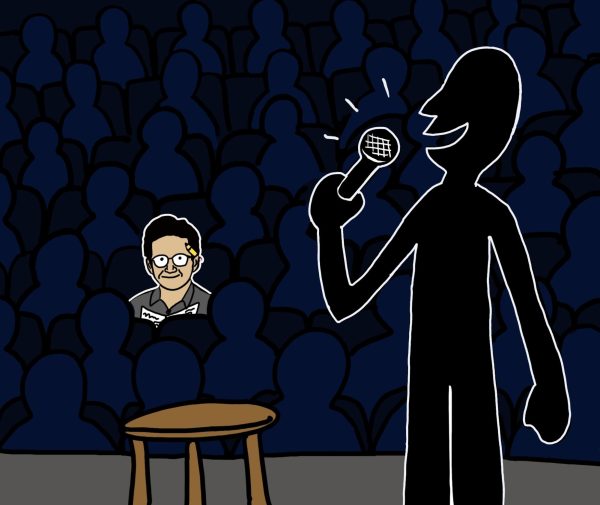The evolution of comedy shows from 2010 to 2020
December 14, 2020
The Office, Parks and Recreation, and Glee are all well known for their character development, drama and an array of witty humor. However, offensive jokes that were once deemed comical and “okay” for TV are now vanishing due to increased awareness and social movements, like #MeToo or the legalization of same-sex marriage. Looking back even ten years in the past, humor that degraded people or questioned their fundamental human rights was never funny, and thankfully now, current shows such as Never Have I Ever, Sex Education and Black-ish instead provide a social consciousness to audiences while remaining comedic.
The American political sitcom Parks and Recreation, starring comedians such as Amy Pohler as Leslie Knope, Aziz Ansari as Tom Haverford and Chris Pratt as Andy Dwyer aired on NBC from 2009 to 2015. Fans of the show were fascinated by the behind-the-scenes glimpse at Pawnee, Indiana’s Parks and Recreation Department, but some moments on the show disheartened audiences.
In one episode titled, “The Stakeout,” Leslie and Tom hide in a van to spy on Ann and Mark’s date night, while also trying to catch an intruder in the community garden. Leslie tries to strike up a conversation with Tom so they can get to know each other more. When she asks Tom where he is from, Tom replies that he is from South Carolina. Unconvinced, Leslie asks him, “Wait, but where did you move to South Carolina from?” To which Tom responds with, “My mother’s uterus?”
Freshman Elyse King gives her opinion of the scene.
“Why would you even ask that? I’m so confused as to why people can’t accept people of color being born in the United States,” King explains. “I feel like it’s mainly the producers’ fault for not doing a better job.”
After Tom told Leslie that he was born and raised in South Carolina, Leslie still wasn’t satisfied with his answer. Why couldn’t Leslie accept that Tom was born in America?
In comparison with Tom being made fun of for being Indian-American, Mindy Kailing’s 2020 Netflix comedy show Never Have I Ever follows an Indian-American girl, Devi Vishwakumar, played by Maitreyi Ramakrishnan. This show has unique storytelling done by professional tennis player John McEnroe and has Indian culture at the forefront of the show while uplifting the voices of POC and the LGBTQ+ community. There’s even an episode called “…Felt Super Indian” where the episode is centered around the Hindu holiday Ganesh Puja.
While at the Puja, Devi struggles with her identity and is hesitant to be proud of her Indian culture. As the only Indian character in The Office, Kelly Kapoor, played by Mindy Kailing, was a very whitewashed character. We hardly ever get to see Kapoor represent her Indian culture, unlike Never Have I Ever, where Indian culture is portrayed realistically and Devi’s struggle to balance her culture with being a normal teenager is a big part of her character.
The Emmy-winning television series, Glee, became known for its satire humor shortly after it aired in 2009. During the first couple of seasons, Glee was praised for its modern outlook on the problems of high school stereotypes in a derogatory society. Since then, Glee has risen in popularity among a younger audience, but much of the comedy does not hold up today.
In one episode, a student falsely accuses the P.E. teacher, Coach Beast, of touching her inappropriately. The student, Brittany, was doing this in an attempt to end their teaching career. Glee makes a mockery out of it, having Brittany humorously point to a doll to show where the teacher touched her.
The narrative in this episode makes it seem like if victims speak up, their accusations will be disregarded and treated comically, which can be really damaging for those who have been assaulted. Avid Glee watcher, freshman Emerson Kimrey, was one of the people shocked by this scene.
“If you’re gonna have these deep storylines, you should actually put effort into them and not offend everyone along the way,” Kimrey says.
More current shows such as Netflix’s Sex Education, does a much better job uncovering the sexual abuse that 81 percent of women will go through in their lifetimes. In the third episode of the show, a character named Aimee experiences sexual harassment while she’s in a public bus. After the incident, Aimee no longer feels comfortable with her boyfriend touching her. Feeling like this is common among survivors of sexual violence, and the show brings the incident to light setting a concious tone for the show.
Fans of the popular sitcom The Office watched Michael Scott, played by Steve Carell, lead his employees at the Dunder-Mifflin Paper Company branch in Scranton, PA. This originally British show was adapted for an American audience when it aired from 2005 to 2013 on NBC.
As the show progressed, viewers never saw a dull moment at this paper company. They saw a whirlwind of character development and growing relationships, and laughed at the hilarious content. However, there were many times where Michael cracked inappropriate jokes that were offensive towards the women and people of color.
In an episode titled, “Diversity Day,” Michael imitates a Chris Rock comedy routine, which forces the staff to do a racial diversity seminar. In one scene, Michael instructs everyone to put a card on their forehead that is labeled with a race. He tells people to go around and treat others like the race that is written on their forehead. He then walks around and encourages people to say untrue stereotypes about certain races so that the other person can guess the race.
“He had a few redeeming qualities, but the jokes he made went a little too far, and they didn’t make it easy to like him,” a freshman at ETHS says. “He also never got put in his place for acting the way he did, which I think should have happened.”
Unlike the way The Office talks about race, the American television series created by Kenya Barris called Black-ish uses humor to explore a range of heavy topics in a meaningful way. One episode titled “Hope” focuses on police brutality, while maintaining a light hearted tone. In the episode, the Johnson family talks about a fictional court case while watching the news coverage of it involving an Black teenager being the subject of police brutality. The episode brought the Johnson family together by having them talk about the court case and about how poorly Black people get treated by the police. The writers were able to balance jokes with a serious topic in a meaningful way, rather than try and be humorous with blatantly offensive jokes like in The Office.
The use of dark humor in these well-known shows was approved for TV in the early 2000s. However, current shows display a consciousness that unbenounced by shows like The Office and Glee. Instead of offending viewers, popular shows in 2020 have allowed us to laugh, relieve stress, while respecting and honoring the identities of their characters.






















